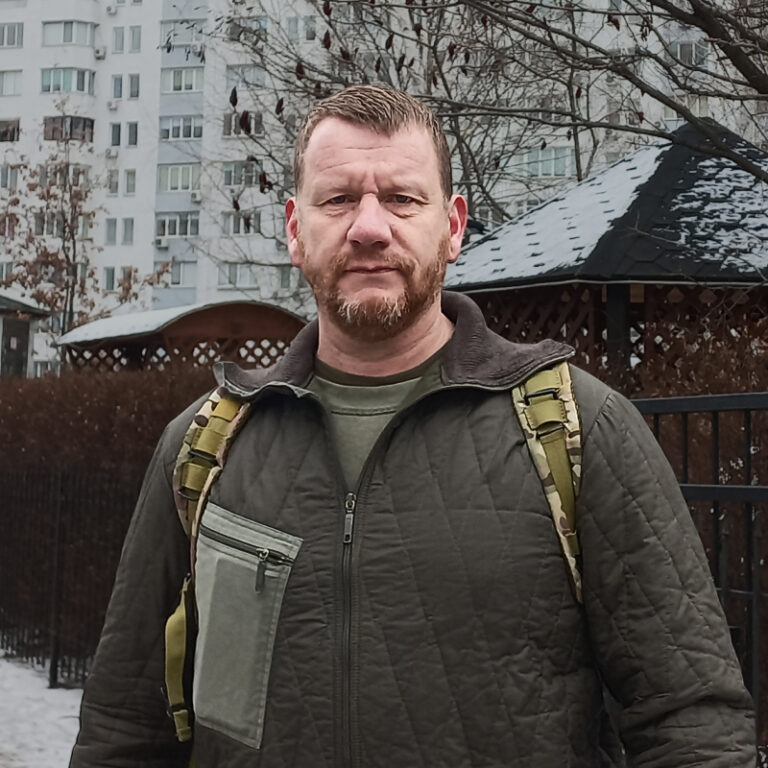
Michael Kröger, a former Bundeswehr soldier, has been living in Kyiv since 2018. When Russia launched its full-scale invasion on 24 February 2022, he didn’t flee. Instead, he stayed behind to provide aid and has been doing that ever since. What motivates him?
It’s early in the morning, just before five o’clock, in an eastern district of Kyiv. The night had been loud, as usual. The air defence had taken down Russian Shahed drones, but now everything is quiet. There’s still no traffic on the streets, as the curfew ends at five. Michael and I head to the truck, each with a mug of coffee in hand, and we sit down in the cab.
The truck’s cargo hold is packed with relief supplies: nine pallets of food, hygiene products, and clothing, as well as bed frames, mattresses, chairs, and tables — over five tonnes in total. We’ll be delivering most of it to an aid organisation in the eastern Ukrainian city of Pavlohrad, with the rest going to Kostyantynivka in Donechchyna.
Pavlohrad is a city of 100,000 residents, many of whom are internally displaced persons (IDPs) from further east in Ukraine. They fled the war and Russia’s bombing campaign, losing everything in the process. Most were only able to leave with their documents and a few belongings. Nearby Kostyantynivka is located just a few kilometres from the front line in eastern Ukraine. Those who haven’t yet fled are mostly elderly, enduring daily Russian bombardment, power outages, and a lack of running water or heating. The relief supplies we’re delivering are meant for the people in these two cities.
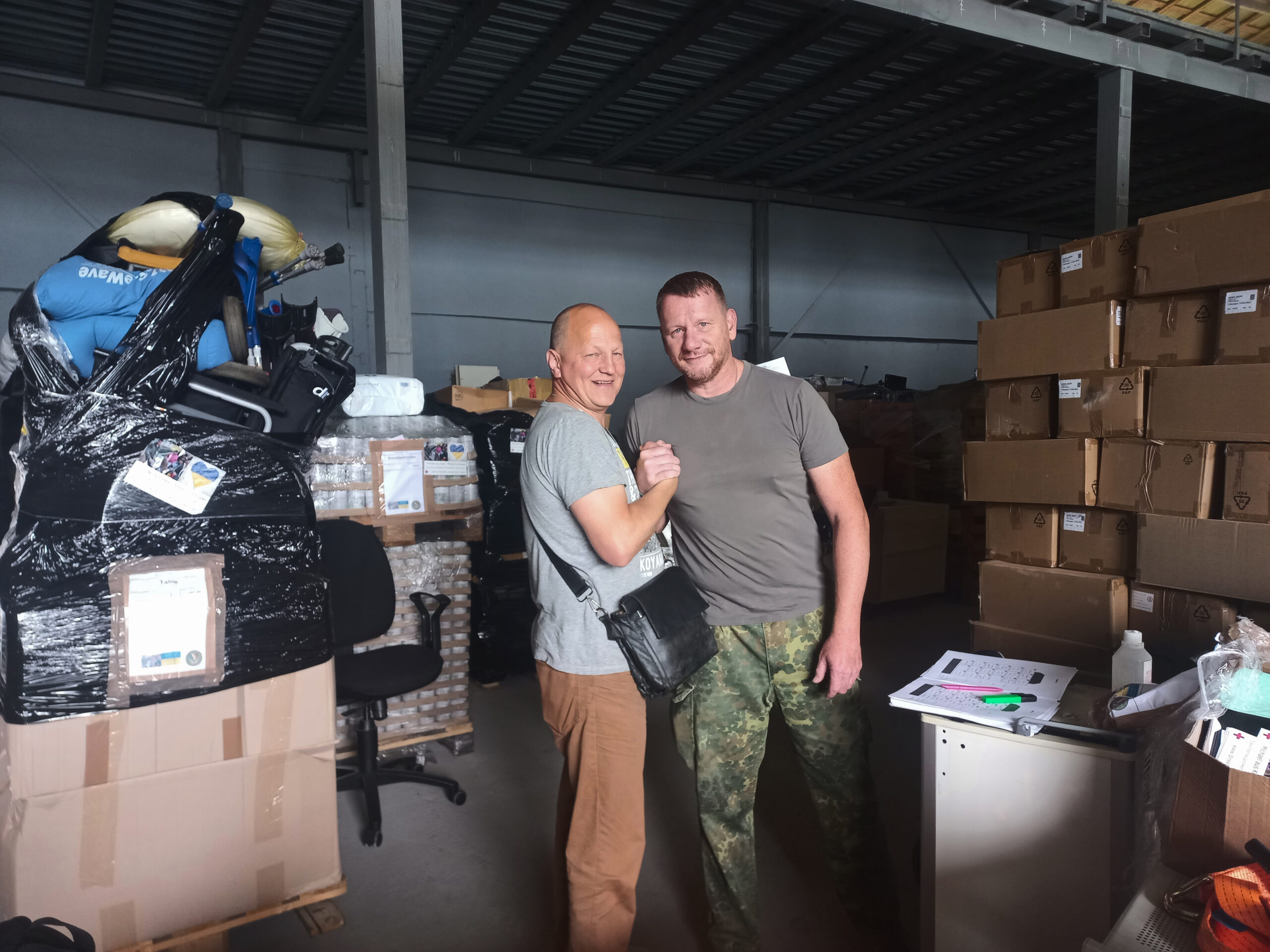
Michael Kröger, 52, has been distributing aid in Ukraine for three years, gathering supplies in Germany with his Ukrainian wife, Anna. His organisation, Direkthilfe Ukraine (“Direct Aid Ukraine”), reflects his hands-on approach — he personally delivers collected aid. I met Michael by chance in early summer 2023 on a train from the Polish town of Przemyśl to Kyiv. We’ve kept in touch since. Sometimes, I help collect donations for his trips or assist him while he’s on the road.
Michael starts the engine at five o’clock. We have 550 kilometres ahead of us that day — seven hours of driving. With breaks at petrol stations and stops at checkpoints, it’ll take about nine hours. The police and soldiers at a checkpoint on one of Kyiv’s exit roads are friendly. They wave us on when they hear the word “volunteers”. They’re always kind at the checkpoints, often thanking us when they learn we’re volunteers from abroad. It’s often quite moving, as if they’re saying, “Thank you for not forgetting Ukraine and us here.”
Michael Kröger is no ordinary foreigner in Ukraine. He comes from the small town of Barssel in northwestern Lower Saxony and has been living in Kyiv since 2018. He came to the Ukrainian capital for love — and stayed. He also realised that businesspeople in his industry, the financial sector, have an easier time here than in Germany, so he moved his headquarters to Kyiv.
For a long time, he paid little attention to Ukrainian politics. The war Russia started against Ukraine in 2014 felt distant to him. He had never been to eastern Ukraine until 2022. Then came 24 February 2022.
At dawn that day, Michael and his wife Anna woke to the sound of bombs and rockets exploding in Kyiv. Many foreigners evacuated from the Ukrainian capital on 24 February and in the days that followed. Back then, hardly anyone from the outside believed Ukraine could withstand the Russian assault.
This time, Michael didn’t think twice. He admits that to him, it was simple: he would stay for as long as possible – as long as the Russian army wasn’t in the city that had been his home for so many years.
Michael served as a professional soldier and military instructor in the German army for twelve years. He was part of an elite naval unit trained for lone combat. On the morning of 24 February 2022, he immediately switched into “soldier mode” in Kyiv, he says.
“I tried to get a sense of the situation,” he says. “My plan was to stay in Kyiv until the Russians had almost completely encircled the city. Then, on the second day, a notice appeared in our block calling for volunteers to help with the defence. Most of the residents had already left. I got in touch and quickly realised that none of them had any experience in defence or the military. And I saw older men and women with children. It was clear to me — I couldn’t just abandon these people.”
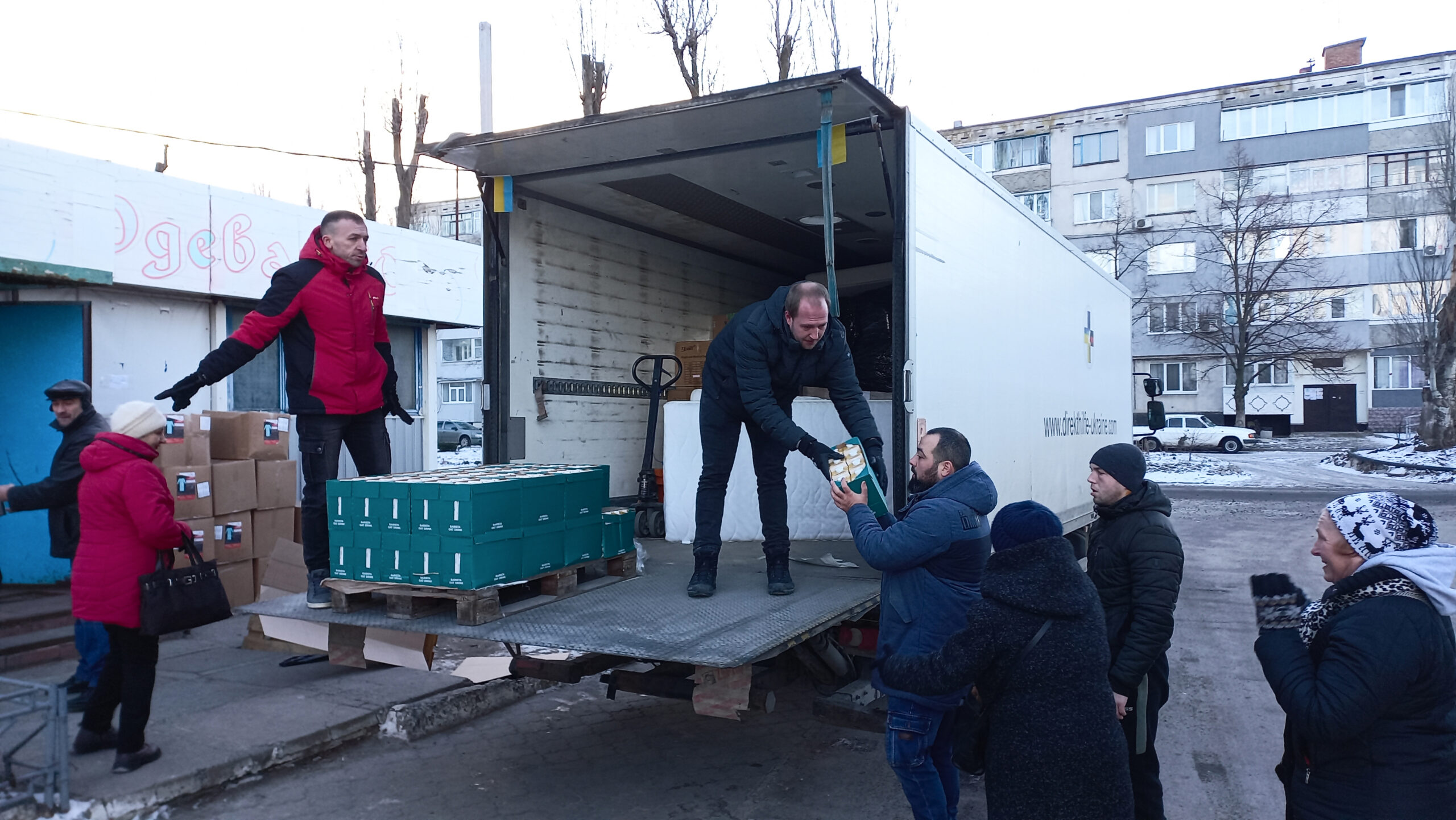
Michael helped organise territorial defence in his neighbourhood. Together with local residents, they patrolled in shifts around the clock and set up a supply point for food, drinking water, and medical aid. After nearly a week, he arranged for his Ukrainian wife and their son to leave for Germany, to his hometown in Lower Saxony.
“My wife was struggling more and more mentally. It was clear that it would be better for her to leave. I organised the train journey from Kyiv to the Polish border for her and our son. Two friends picked them up there and took them to my hometown in Germany,” he says.
By this time, friends and acquaintances from Germany were already reaching out to Michael, asking how they could help and what was needed. Food, bandages, medicines, and other medical supplies were quickly collected. Michael organised transport to the Polish border and picked up the supplies in a van that an acquaintance had lent him for the task.
“That was in mid-March 2022,” says Michael. “I took the supplies to a military hospital in Kyiv. That was my first transport and the start of everything. I posted videos of it, and as a result, I received a lot of enquiries and other offers. From there, I just kept going. I told friends and acquaintances what I needed — relief supplies and also money for transport costs. At that point, the organisation Direkthilfe-Ukraine didn’t exist yet. I was a lone operator, so to speak.”
In the first few weeks, Michael made multiple trips between the Polish border and Kyiv in the borrowed van.
“However, I quickly realised there was no point in just driving to the villages on the front line with such a small van,” he recalls. “You get there and can only hand out a tin of food and a packet of noodles.”
In April 2022, he decided to take a short trip to Germany to visit his wife and buy a truck during his stay there. “I used some of my own money and some of the donations for it. It was a 12-tonne truck that I could load with six or even seven tonnes, depending on the road conditions and the length of the journey. Then, I drove it back to Kyiv, fully loaded,” Michael says.
Soon after, Michael was offered free storage space in warehouses by friends near his German hometown and also in Kyiv, and he founded the organisation Direkthilfe-Ukraine. Since then, the process has looked like this: Material donations from Germany first arrive at the warehouse there and are then transported to Kyiv by affordable haulage companies. From there, Michael drives the relief supplies to locations across Ukraine.
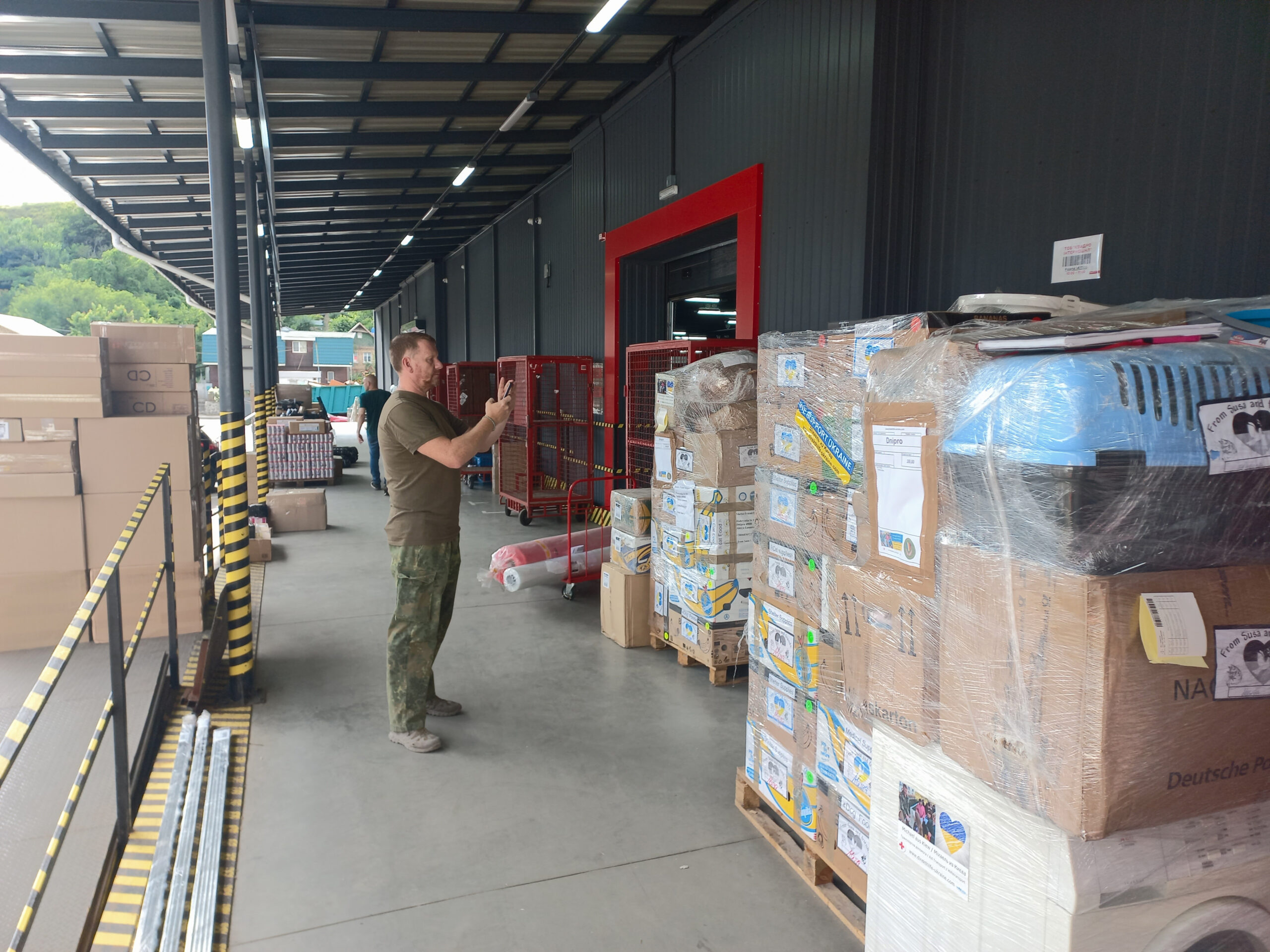
Michael’s wife, Anna, who has been living in Germany since March 2022, handles the transport planning and the bureaucratic requirements. Michael has largely handed over the operations of his company to an administrator, remaining a sort of silent owner.
“The special thing about our transports is that everything we bring here has been requested in advance,” Michael says. “With many other organisations, the items end up somewhere behind the Ukrainian border, and then you often don’t really know what happens to them. We work on request and document where everything goes in each case.”
In the meantime, Michael and his team of supporters in Germany and Ukraine have brought more than 600 tonnes of relief supplies to Ukraine and distributed them. “It all started with me, of course,” he recalls. “But it’s now a team effort because there are many people involved. Especially my wife, who acts as a kind of manager and takes care of all the bureaucracy, but also people who pack and load in Germany and others who sometimes travel here to help with the distribution.”
We are arriving in Pavlohrad, in a side street just outside the city centre – the location of the Zhyva volunteer centre’s warehouse. As the truck arrives. Oksana Zhyvaha and her team are already waiting. They greet Michael warmly, with loud hellos and hugs. He’s like an old friend. He’s been here many times over the past two and a half years — so many times, in fact, that he’s lost count.
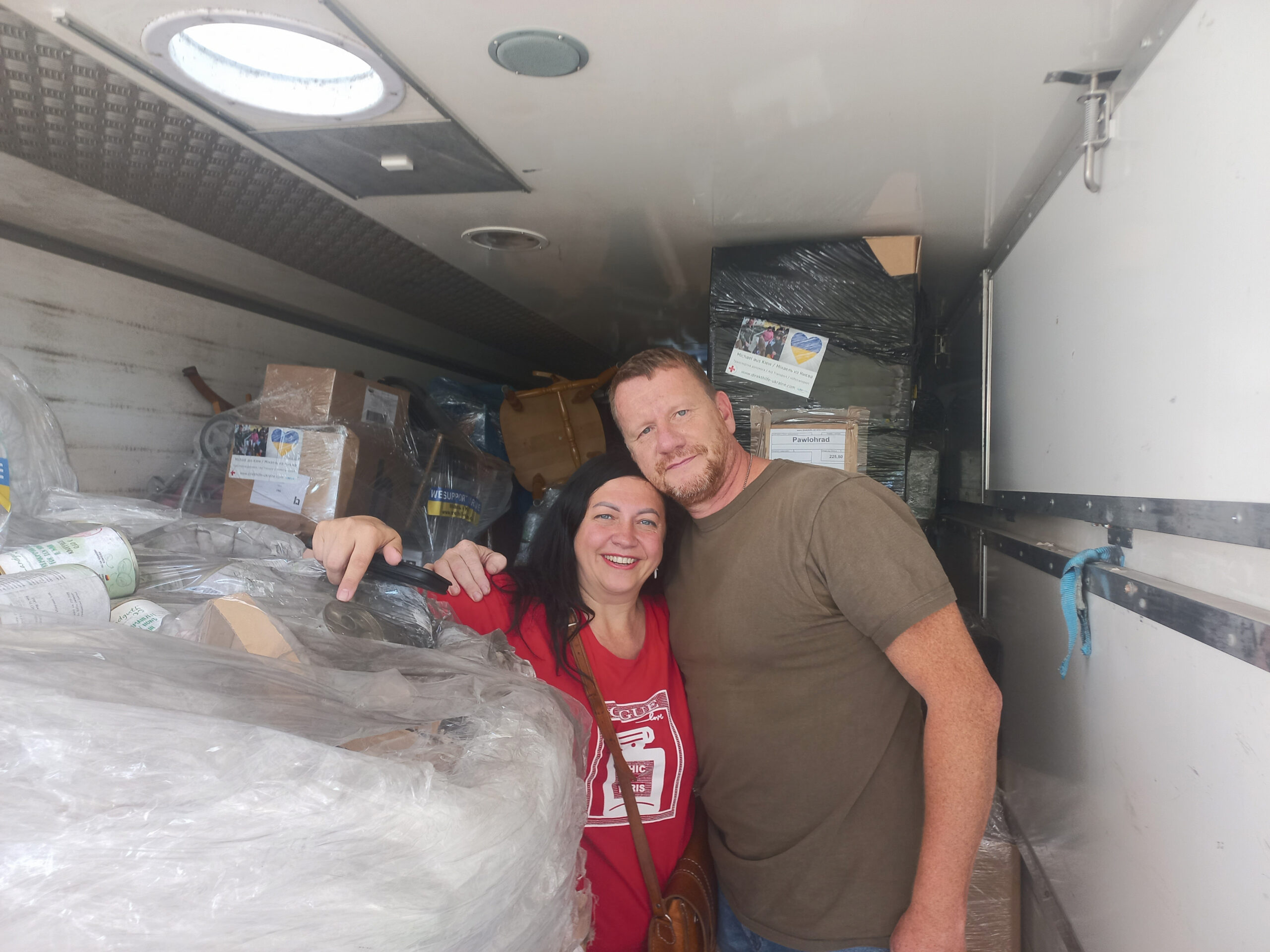
Oksana, originally a teacher, has been active in Ukrainian charity and volunteer organisations for over a decade. She began helping internally displaced people in her hometown of Pavlohrad right at the start of the all-out Russian war against Ukraine. In the early summer of 2022, she and her daughter Alina founded the Zhyva volunteer centre.
Pavlohrad, with a population of around 100,000, is about 120 kilometres from the front line in the east of Ukraine. The city occasionally comes under attack from rockets or Shahed drones, but it’s far enough from Russian artillery and smaller drones to be relatively safe. Civilians fleeing the frontlines make their way here, often as their first stop. Some move on after a few days or weeks, while others stay. At any given time, around 30,000 internally displaced persons (IDPs) are living here — about a third of the city’s population. Most of the IDPs are elderly people, women, and children. Oksana and her team are here to help.
Michael has brought six pallets of food and hygiene products with him today, including milk, flour, pasta, sugar, baby food, nappies, soap, and shampoo, along with 30 mattresses, wheelchairs, walking aids, and cots. About 20 volunteers from the team quickly unload the items and take them to the storage rooms. The mattresses are handed out directly to those on the waiting list, who are now queuing outside the centre. It’s clear that many of them feel uncomfortable being here. “Sometimes, when they arrive, they’ve been sleeping on blankets on the floor or simply in sleeping bags for weeks,” says Alina, Oksana’s daughter.
This is also the face of Russia’s war against Ukraine, which Russia calls “liberation,” that is destroying the lives of millions of people — their families, jobs, property, homes, and everyday lives.
We take a few photos of the items we’ve brought and of the team for the donors. Oksana and her team thank us from the bottom of their hearts. Then, we sit down to eat. As always, Alina has cooked for us — today, we have borscht and pyrizhky stuffed with cabbage.
We sit together and chat. How’s the situation and the mood in the city? “Normalno,” (“fine” in Ukrainian – ed.) they say. You hear that a lot in Ukraine. It means “normal,” but it’s hard to translate exactly. Ukrainians use it, for instance, when nothing is actually okay, but they’re too tired to talk about it. They know their neighbour Russia wants to destroy them; they live with that reality every day. There are often tears, but Ukraine is a place where one rarely hears complaints.
Later in the afternoon, we head to our sleeping quarters. “So,” Michael says in his usual, no-nonsense way, “we’ll continue tomorrow at 5:30 am.”
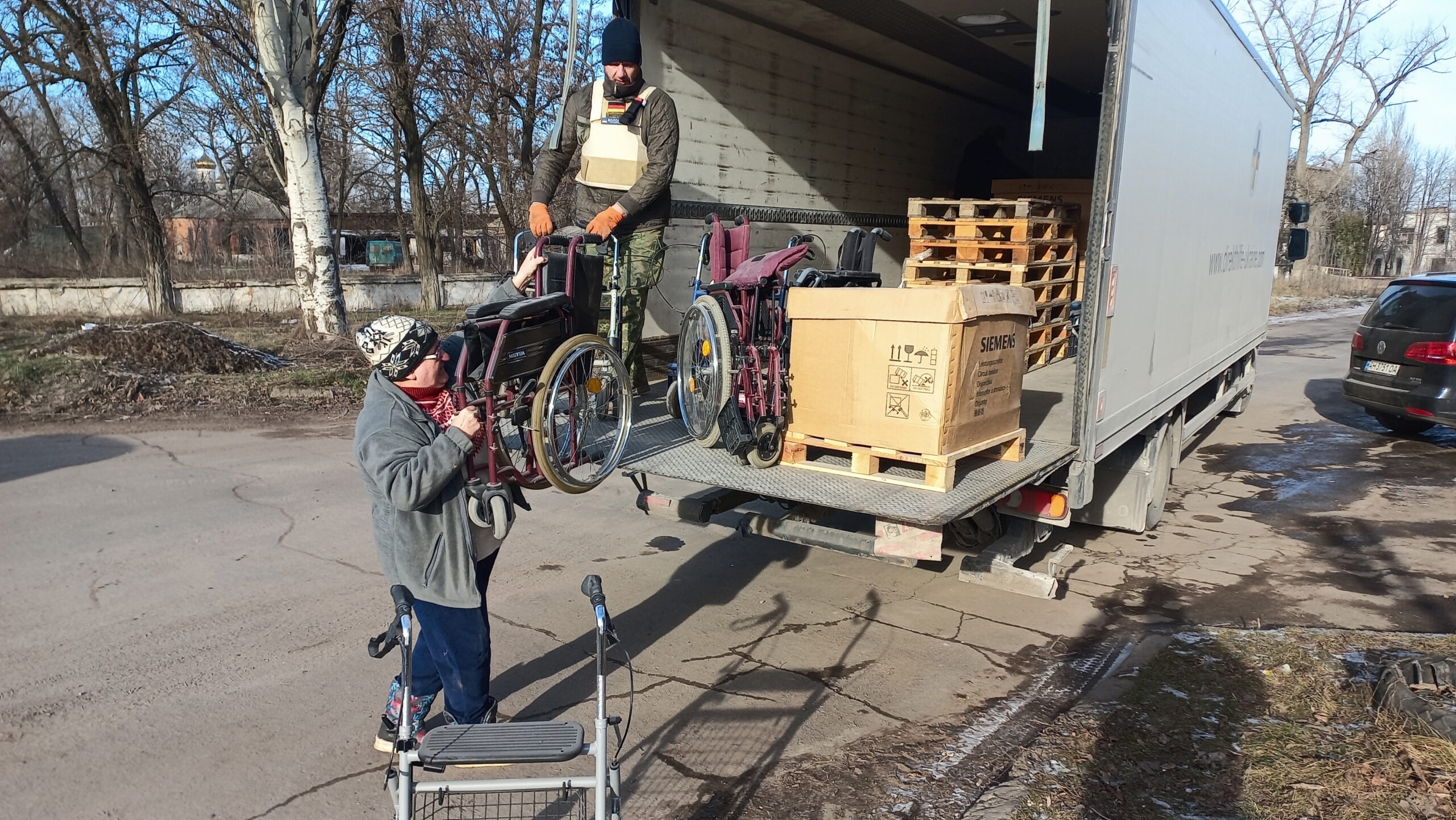
The next morning, we are heading to Kostyantynivka. The town, in the western part of Donechchyna, is just a few kilometres from the front line. As we drive, the destruction becomes more and more visible — bombed-out businesses and factories, shattered roads and bridges, ruined apartment blocks, and farmhouses. It’s a disturbing sight – and it’s disturbing to know that Russia won’t stop, that it will keep destroying Ukraine, piece by piece, for as long as it can.
We drive in silence towards Kostyantynivka. At some point, Michael says, “Our politicians should come and see this.” He means the Germans. After a while, he adds, “The West and Germany bear responsibility for all of this — for all the deaths. If Ukraine had received all the necessary weapons from the start, they could have driven the Russians out quickly. But instead, the Russians had time to bring in more and more supplies and entrench themselves. And that’s why we’re in this situation now.”
A few kilometres from Kostyantynivka, a thick column of black smoke rises into the sky — an aerial bomb hit the eastern part of the city. Hardly any houses or apartment blocks remain intact. Almost every building has lost its windows, now covered with chipboard. Ruins are everywhere. Kostyantynivka is on the brink of becoming the next Bakhmut, Avdiivka, or Kurakhove (the destroyed cities in the east of Ukraine – ed.).
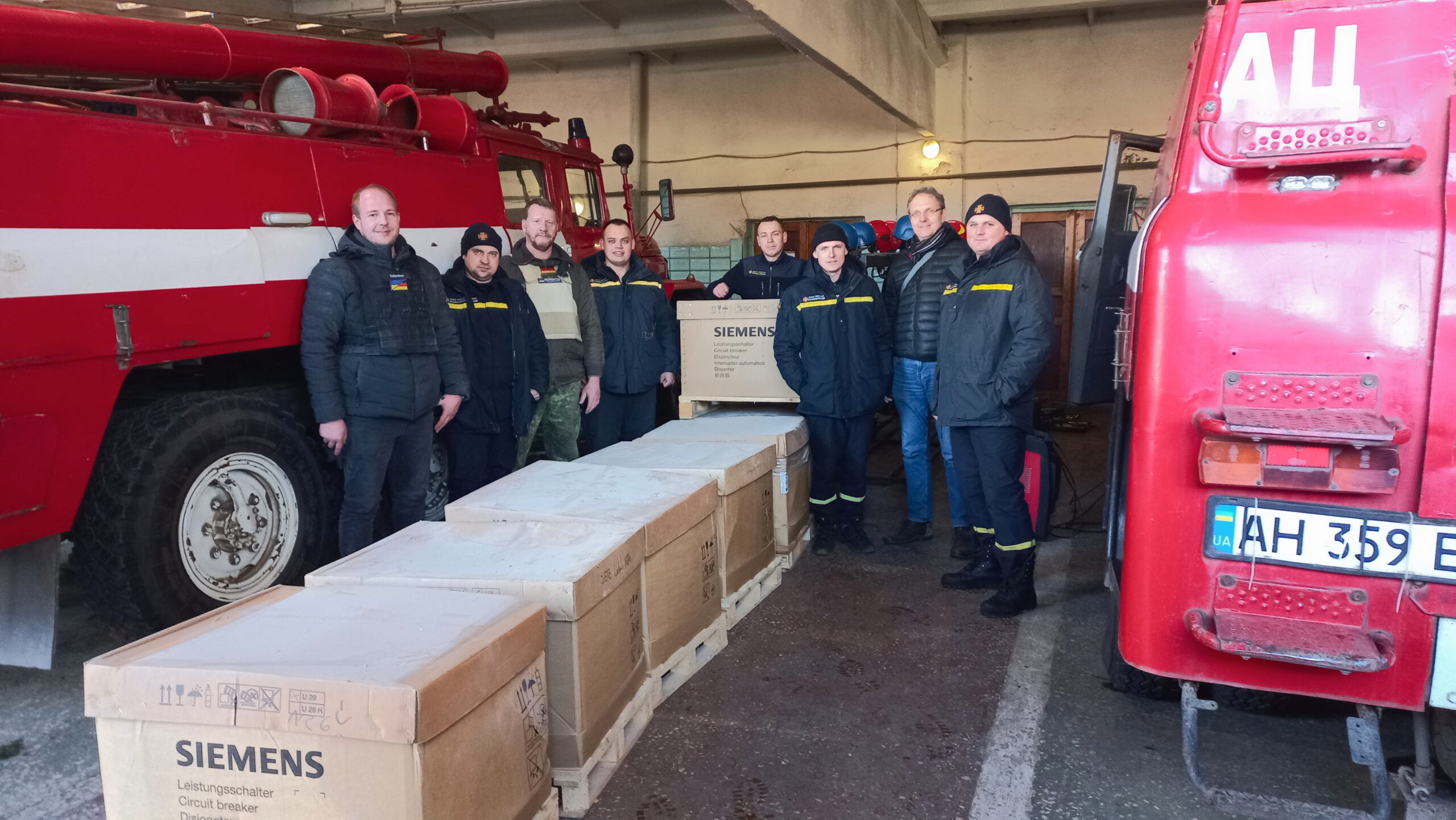
We are driving to Olha Savertanaya’s “humanitarian point” – a small shop on the outskirts of town that once sold everything from household goods to spare parts. Now, it serves as a warehouse for relief supplies. Michael has brought food and hygiene products for Kostyantynivka, along with gowns, bandages, and disposable bed linen for hospitals, as well as protective clothing and equipment for firefighters.
We unload everything except the fire brigade equipment, alongside Olha’s team, which consists of older men and women, unfit for military service. Later, we are heading to the fire brigade. In the distance, we can hear artillery fire from the front near Chasiv Yar, another place reduced to rubble. At one point, a muffled bang echoes, and a slight pressure wave moves through the air. Olha and her team glance around, but there’s nothing to see, so they just carry on unloading.
We get something to eat here too. Olha has baked mlyntsi (thin pancakes – ed.) and laid out a large platter of cheese, sausage, bread, and fresh, sliced vegetables. When asked how she feels amid the constant bombardment, she simply says, “Potykhenky” (“Getting by” in Ukrainian – ed.) – an untranslatable expression of Ukrainian patience. In saying it, she means, “Slowly, it will get better.”
Despite the danger, Olha doesn’t want to leave the city. She resides here with her son, who has disabilities. The woman only receives a small pension and has no other relatives in Ukraine. Olha keeps meticulous records: her handwritten notebooks are full of thousands of names of people who regularly receive support.
“Many people think that we are secret traitors, waiting for the Russians, but that’s not true. We are Ukrainian patriots. I just don’t know where to go. I’ll stay here as long as I can,” the woman says.
Time is tight — we need to reach Kyiv before the midnight curfew, load the lorry the next morning, and set off on our next tour. So, we say our goodbyes quickly.
It’s going to be a long journey — 700 kilometres, ten hours. Michael has been travelling through Ukraine for nearly three years now, covering tens of thousands of kilometres. He’s hardly done anything except deliver aid to people. In the first winter of the war, he and his wife packed 500 presents for children in Ukraine. Michael dressed up as Father Christmas for the handover and personally gave each child their gift. In the second winter, there were a thousand presents. This winter, it’s 2,500. Michael has also spent several weeks volunteering, driving injured soldiers from the front lines to hospitals. When in Germany, he drives around to pick up material donations or speaks to people, encouraging them to donate money for transport costs. He’s only had a few brief holidays with his wife.
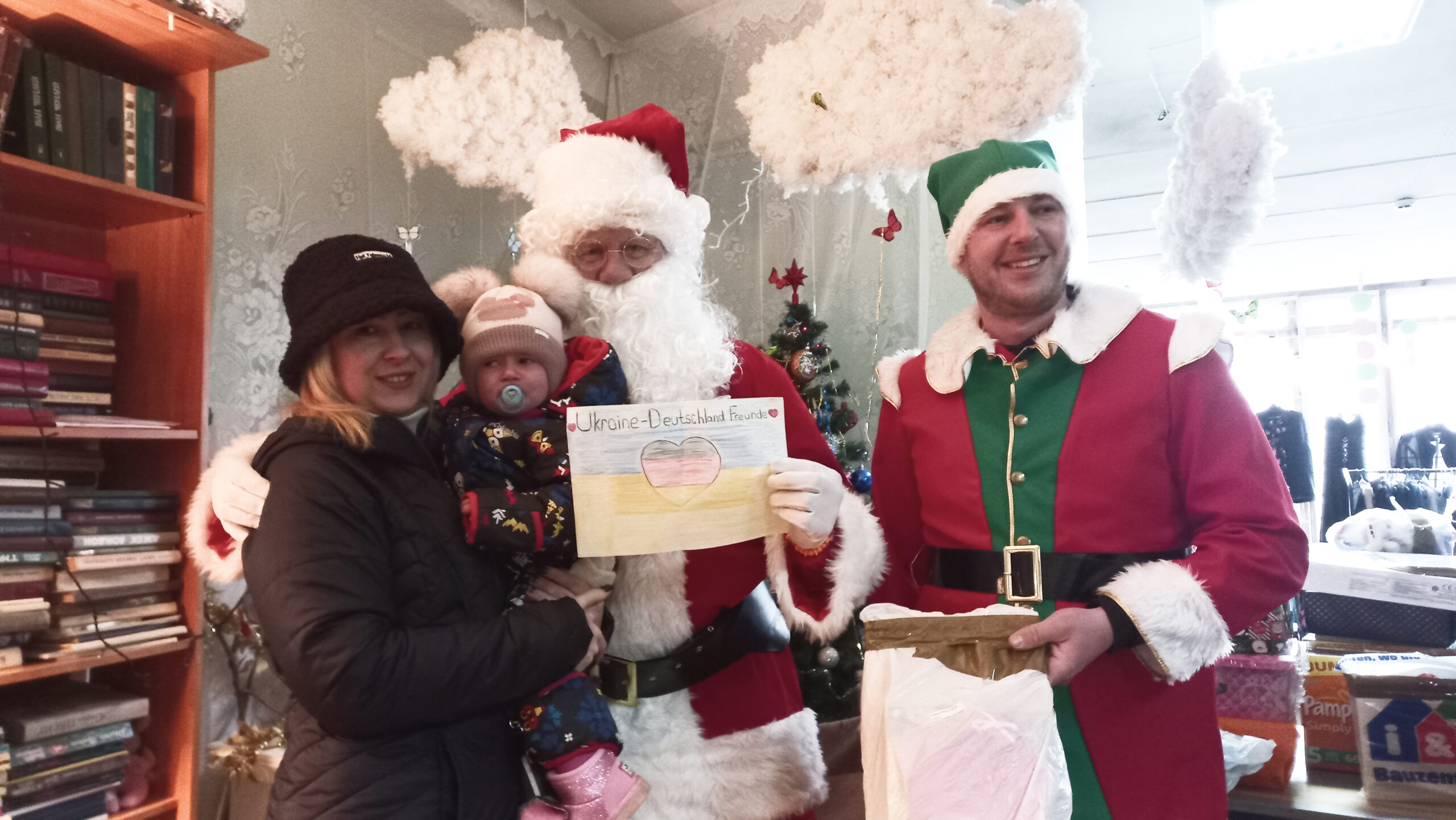
Speaking about why he does all of this, Michael shares a story from the spring of 2022, just weeks after the full-scale Russian invasion began. Then, he had a 10-hour drive on barely passable roads to a newly liberated village northeast of Kyiv, with blown-up bridges along the way.
“We slept on the floor in the village hall that evening. The next morning, the people came and waited very patiently for their turn for distribution. Most of the women were crying. They told stories of children being murdered while playing, of a man shot by the Russians in a tank — simply out of pure malice. You can’t forget something like that.”
Michael falls silent for a moment before adding, “At the end of the day, it’s my home. My wife and I have friends here, our flat, and all our things. It’s just the feeling that you want to defend your country and your people – that you have to do something.”

